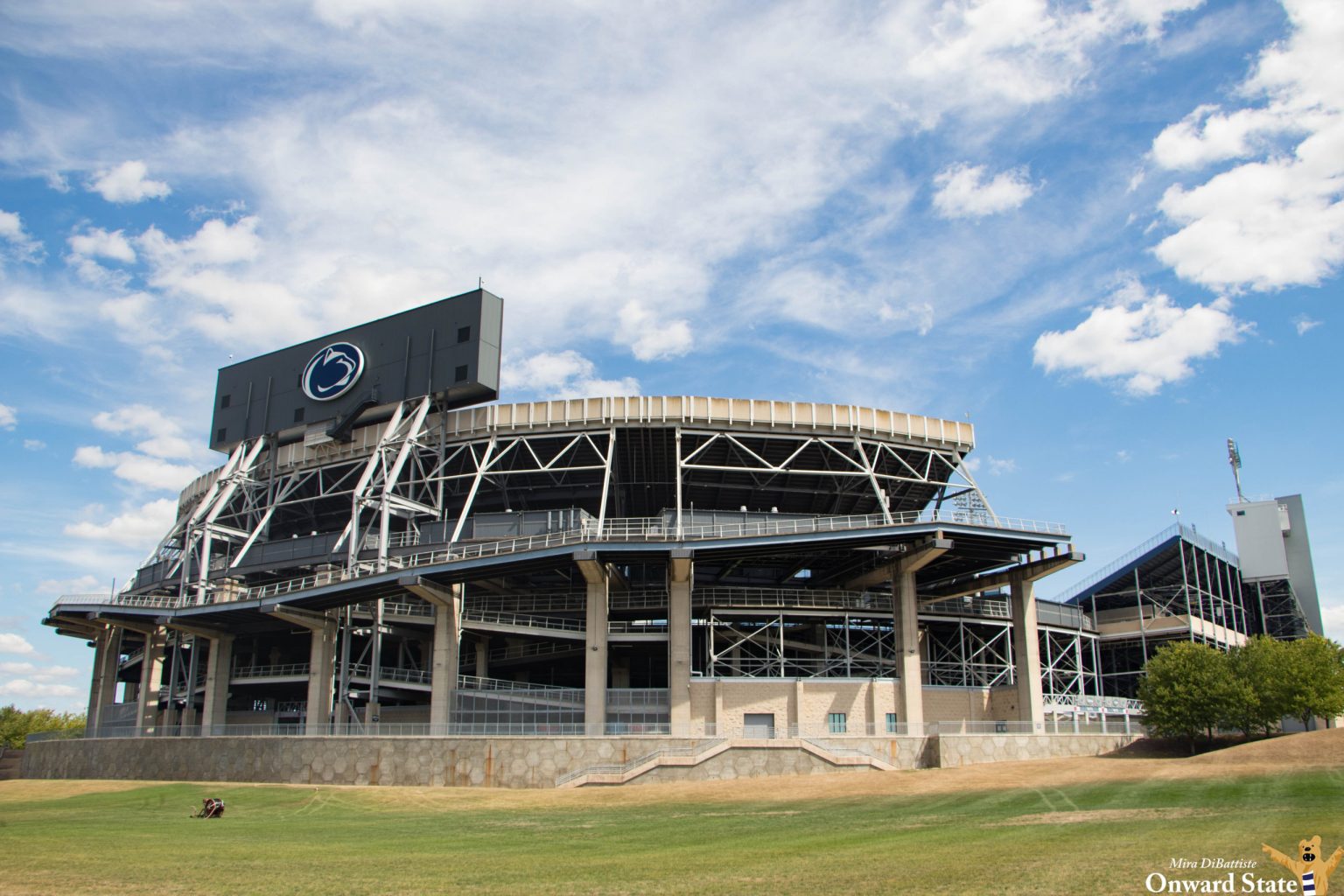
Beaver Stadium. Photo by Mira DiBattiste | Onward State

Beaver Stadium. Photo by Mira DiBattiste | Onward State
Potential expanded sales of alcohol during Penn State football games at Beaver Stadium took a big step forward on Monday.
During a virtual meeting, the university’s Board of Trustees Committee on Legal and Compliance recommended by a 6-1 vote approval of a plan to sell beer and hard seltzer on the concourse levels of the stadium.
The full board will consider approval at its Sept. 23 meeting.
Athletic department administrators offered no firm date for when sales would begin if approved, but the department has already begun much of the ground work through a partnership Oak View Group (OVG) Hospitality and is aiming to start this season.
Athletic Director Patrick Kraft said “we’d like to dry-run it” at the Northwestern game on Oct. 1.
“We were not going to move forward until, or if, you all want to move forward,” Kraft told the trustees. “This is not something you take lightly. You have to do the due diligence and be ready to do something like this… We have not invested anything that we cannot and are not using… Candidly, whenever you say go, we can go. And if not, we’re good.”
Beer and seltzer stations independent of concession stands would be placed “strategically” throughout the stadium to prioritize flow and speed, and would not be located in the area of the student section, Kraft told the committee.
Patrons would be required to have their IDs scanned to receive a wristband and to purchase alcohol, which will be limited to two drinks per transaction.
Alcohol sales would cease at the end of the third quarter.
More than 300 additional staff members hired by OVG and certified in Pennsylvania’s Responsible Alcohol Management Program would be dedicated to oversight, rule enforcement and sales operations. A Liquor Liability Task Force would provide “an additional layer of security” for ID checking, Deputy Athletic Director for Internal Operations Vinnie Jones said, and a “secret shopper” program would help ensure underage individuals aren’t being served. Eight to 10 managers from other OVG-affiliated venues around the country would be brought in to provide support.
“There was no way possible we could pull this off by ourselves just doing it in-house,” Kraft said.
Anyone found to have tampered with wristbands will be ejected, referred to law enforcement and will risk losing season tickets.
“I will not sit here and tell you it’s a foolproof plan, but we feel really, really confident with the strategy we have in place,” Kraft said.
Penn State has held a public venue liquor license for the stadium since 2016, but has only permitted alcohol sales in the suite and club areas. Kraft told the committee that several factors drove the request to expand to full-scale sales. Those include providing “a significant enhancement to fan experience and gameday atmosphere,” Kraft said, noting that in the most recent fan survey about Beaver Stadium improvements, 50% of respondents were definitely in favor of alcohol sales and 21% were definitely opposed.
He also said that data has shown a reduction in alcohol-related incidents at college football stadiums that serve alcohol in-venue, ranging from 35% at West Virginia to 87% at Texas to 243% at Maryland.
“There is… data that shows this,” Kraft said. “We believe this could actually help some of the situations on game day.”
In the first year, the athletic department expects a small net loss because of start-up costs. Most of the equipment being purchased are one-time costs that can be used for other purposes as well, such as 140 new mobile point of sale units that can be used at any concession stands. First-year expenses are projected at $2.4 million, with revenues near that but slightly less, Senior Associate Athletic Director Carl Heck said.
In the long-term, revenue generated from alcohol sales will be used for deferred maintenance projects at the stadium.
Trustee and committee member Donald Cairns was the lone vote against recommending approval, saying there’s “a lot of unanswered questions.”
“I don’t think we’re ready to move this forward yet,” Cairns said.
Trustee Valerie Detweiler, who is not a member of the legal and compliance committee, said she felt the board should have been brought into the discussion earlier in the planning for what would be “a major change to how we do business.” She added that she is concerned about how it would change the gameday experience.
“Coming to Beaver Stadium with families is part of how we build Penn Staters,” Detweiler said. “Everyone has an opportunity for alcohol outside of the stadium if they want it to be part of their day. I just don’t understand why we need that to be part of our day inside the stadium. I think we really need to decide… if that’s what we want our experience at Beaver Stadium to turn into, because the safety part, you can’t refute that the facts are there for that, but it is going to change our gameday experience in the stadium.”
Penn State would become the ninth Big Ten school to offer stadium-wide alcohol sales.
Trustee Brandon Short, who is not on the committee, said he also would have liked more time, but suggested if other schools can manage alcohol successfully then Penn State should be able to do so as well.
“If [eight] other schools in our conference are able to do this successfully and we’re saying we can’t, then what are we saying about our people,” Short said. “…If there’s an issue we can always move back. We can always take it away if for some reason it doesn’t work.”
Receive all the latest news and events right to your inbox.

80% of consumers turn to directories with reviews to find a local business.